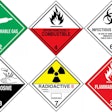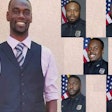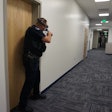Mike and I were walking home from school the first time I heard him call his mom a "bitch." Still a couple of years shy of junior high, I was shocked by his choice of words.
"What did you call her?"
"A bitch," Mike said. "I hate her. You want to see what she did to me?"
Before I could answer, Mike turned away from me and lifted his shirt.
A mosaic of serpentine swaths curled from one of Mike's flanks to the other, each extreme punctuated by black and blue bruises in the shape of a belt buckle. I'd been spanked many times and deservedly so for the most part. But never before had I seen the likes of Mike's back, and how my fifth-grade peer could have warranted such punishment was beyond my imagination.
When Mike turned back to face me, his face was beet red.
"One of these days," he said, pulling his shirt back down, "I'm going to kill her."
Mike and I had never been the closest of friends, but I felt for him and would never look at him again without thinking about the bruises and wondering what new horrors might be found about his body.
Years passed, and Mike had pretty much fallen off my radar by the time a high school acquaintance flagged me down in a school hallway.
"Did you hear about Mike? He killed his mom!"
The body of Mike's mother had been found on their kitchen floor. She'd been stabbed 51 times, and it didn't take long for Los Angeles Sheriff's Department deputies to take 16-year-old Mike into custody for her murder.
In time, it would become fashionable for defendants to offer "burning bed" defenses, mitigating stories of horrors that, if they did not absolve the defendants, at least offered some context for their crimes. Mike didn't have the benefit of such a defense. At some level I found myself understanding of Mike's actions. However, Mike would have been better served by the state's absolution than mine.
To this day I wonder why I never said anything to anyone about the abuse he'd suffered. I suppose part of my reticence was out of the belief that I was somehow respecting Mike's confidence.
But at least as much was due to my ignorance of the law; I was only a couple years off of getting robbed by assholes on a daily basis myself. I suspect most kids knew not to take rides or candy from strangers, but otherwise had little clue as to what age children have a legal standing to be a victim of any type of crime, let alone what interventions might have been called upon on their or someone else's behalf.
I got to thinking about Mike the other day when I heard about the boy who'd been kicked, punched, and hung upside down atop a fence by some bullies.
A passerby intervened, enabling the victim to get home. But it was the assholes' own idiocy that found them getting caught, thanks to their having videotaped the beating and putting it up on Facebook. In the absence of such evidence, one might reasonably wonder what would have happened to the kid the next time he crossed paths with the bullies.
True, there are some safeguards in place. School administrators are taught to recognize signs of abuse and to report them. If they see a kid getting jacked for his lunch money, they'll (usually) intervene. But these measures are not enough and some things fly below the radar.
I suspect that there are many kids today who are as clueless as I was in my youth, that don't know of their rights in the world, of their reasonable expectations not to be abused by family or strangers, or that they have advocates who would come to their aid.
Cops routinely interact with kids through a variety of youth oriented programs such as DARE, gang resistant training, Explorer academies, summer youth leagues, etc. Such programs encourage kids to do the right thing, and resist the wrong, but they also avail cops the opportunity to educate kids on matters that often get glossed over in classrooms.
If you're not already doing so, the next time that you're doing the cop in the classroom thing, or speaking at a school assembly, please take the time to talk with kids about the fact that they have the right to grow up unmolested in every sense of the word.
I wish someone had told me.
More than that, I wish someone had told Mike.

















